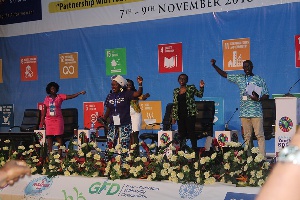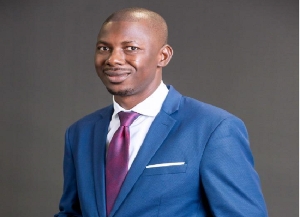Business News of Monday, 12 November 2018
Source: Nestle Ghana
Nestle calls for more private sector involvement at African Youth SDGs summit
Nutrition Health and Wellness Company, Nestlé has called on Private Sector to maximize contribution in building capacity of young people in Africa to take up leadership roles that will enable their development and help achieve the United Nations Sustainable Development Goals.
The call was made during the 2018 African Youth SDGs Summit in Accra under the theme “partnership with Youth to achieve the SDGs: moving from Policy to actions” with over 1,000 young Africans, Private sector partners including Nestlé.
Speaking at the summit on “Promoting decent jobs through innovative agribusiness”, Fatih Ermis, Head of Agricultural Services at Nestlé Central West Africa highlighted the role private sector must play to rejuvenate youth interest in agriculture in Africa.
“Africa has a declining workforce in agriculture with the average farmer being 60 years old. This situation threatens food security and our journey towards zero hunger. It is therefore important for Private Sector to invest in young people and revive their interest in Agriculture.
Mr. Ermis shared how Nestlé is helping over thousands of young Africans to become “agripreneurs” through projects under the company’s Creating Shared Value Approach including Nestlé Cocoa Plan, Nestlé Cereals Plan, Nescafe Plan, Cassava Plan, Feed the future and Nestlé Maize Quality Improvement project in Central and West Africa.
He noted that such efforts will help young people see opportunities in rural living which will eventually curb rural exodus and build a sustainable agricultural value chain.
Nestlé has an ambition to help 10 million young people have access to economic opportunities by 2030. The company demonstrates this ambition through its “Nestlé Needs Youth” initiative which offers trainings, knowledge acquisition and skills development through Graduate and Management Trainee programs, Internships, and National Service.
A core component of this initiative is respect for diversity and inclusion. Marie-Josee Lukubika, Group Product Manager for Baby Food at Nestlé Central and West Africa speaking at the summit on “Young Women in Leadership: Experiences of Emerging young female leaders”, called on more private sector involvement and advocated for young women to be given opportunities to lead to help achieve the SDGs.
“Private sector has a role to play in ensuring gender balance by creating enabling environment for females. Young women are potential agents for growth and development. I am happy to say that at Nestlé, policies are in place to provide women the support they need to help them take up technical and leadership roles and contribute to organizational excellence. I urge companies in Africa to provide young women with opportunities not only for their growth and development but as means to help build thriving, resilient, and inclusive African communities”.
Ms. Lukubika also highlighted that women inclusion could help increase productivity in Agriculture. “The Food and Agriculture Organization estimates that if women were given the same access to productive resources as men, they could increase farm yields by 30% and this will reduce hunger in the world by 12% - 17%”, she added.
Emmanuel Ametepey, Executive Director of Youth Advocates Ghana and convener of the Summit thanked Nestlé for partnering the 2nd edition. Commenting on private sector’s involvement in youth development, he said “it is very interesting to note that all the 17 SDGs are one way or the other connected directly to young people who are the future of Africa. It is therefore apparent that Private Sector gets involved with policies and mechanisms in place to help young innovators, nurture their ingenuity and help them take charge of the SDGs. This is one of the objectives of this summit to help strike partnership between the youth and the private sector”.
It is indeed noteworthy that Private Sector’s partnership with young people will not only contribute to inclusiveness and help achieve the SDGs, it will also nurture today’s youth who are future leaders of the African continent to build on and sustain economies.











